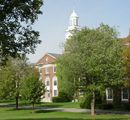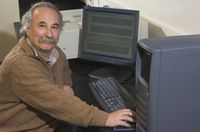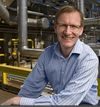Bioelectronics and biosensors
The biosensors and bioelectronics symposium will be devoted to all aspects of modern bioelectronics, including the state-of-the-art in enzyme-based biosensors, immune-sensors, DNA sensors, lab-on-a-chip, biofuel cells, biochemical information processing systems (biomolecular computing) and bioactuators. The topics discussed at the symposium will include the use of nano-structured materials and functionalized interfaces for bioelectronic applications. Integration of various systems for the signal processing, amplification and actuation will be particularly emphasized in the lectures presented in the symposium. Leading specialists in this area will present the novel results and facilitate the discussions with young researchers and students. The symposium will include several invited lectures given by leading experts in the field, oral presentations from young postdoctoral researchers and posters prepared by students.
Session organizer
Prof. Evgeny Katz received his Ph.D. from Frumkin Institute of Electrochemistry (Moscow), Russian Academy of Sciences, in 1983. He was a senior researcher in the Institute of Photosynthesis (Pushchino), Russian Academy of Sciences, in 1983-1991. In 1992-1993 he performed research at München Technische Universität (Germany) as a Humboldt fellow. Later, Dr. Katz was a research assistant (1993-1999) and research associate professor (2000-2006) at the Hebrew University of Jerusalem. In 2006 he became Milton Kerker Chaired Professor at the Department of Chemistry and Biomolecular Science, Clarkson University, NY. He has published more than 280 papers in peer-reviewed journals with a total citation more than 15,000 (Hirsch-index 58), and he holds 20 international patents. He serves as the Editor-in-Chief for IEEE Sensors Journal, Vice-Chair of "Bioelectrochemistry" Division of the International Society of Electrochemistry and as a member of the editorial boards of many international journals (including Biosensors and Bioelectronics, Sensors and Actuators, Electroanalysis). His scientific interests are in the areas of bioelectronics, biosensors and biofuel cells. Currently he is actively involved in research in biocomputing, signal-responsive materials and their applications in logically operating biosensors.
Confirmed speakers
- Prof. Ian Suni, Ph. D., Dept. of Chemical Engineering, Clarkson University: "Detection of Allergenic Peanut Proteins by Electrochemical Impedance Spectroscopy".
- Prof. Omowunmi A. Sadik, Ph.D., Professor of Chemistry & Director of Graduate Studies and Director, Center for Advanced Sensors & Environmental Systems (CASE), State University of New York at Binghamton: "Identification and quantitation of Bacillus globigii using metal enhanced electrochemical detection and capillary biosensor".
- Prof. James F. Rusling, Professor at University of Connecticut and SFI Walton Research Fellow, NUI Galway, Ireland: "Nano-enhanced biosensor array strategies for cancer biomarker proteins".
- Prof. Largus (Lars) Angenent, Ph.D., Associate Professor, Biological and Environmental Engineering, Cornell University: "Addition of oxygen in microbial anodes of bioelectrochemical cells to increase the electric signal".
- Prof. Silvana Andreescu, Ph.D., Assistant Professor, Department of Chemistry, Clarkson University: "Implantable microbiosensors for in vivo measurement of neurological activity and nanoparticle-induced toxicity".
Program
Friday, June 4, 8:30 AM - 11:40 AM
- Bioelectronics and Biosensors
- Kellas 105
Organizer/Presider: Evgeny Katz
8:30 Introductory Remarks
8:35 275 Nano-Enhanced Biosensor Array Strategies for Cancer Biomarker Proteins. James Rusling1, Bhaskara Chikkaveeraih1, Vigneshwaran Mani1, Ruchika Malhotra1, Naimish Sardesai Sardesai1, Shenmin Pan1, Vyomesh Patel2 and J. Silvio Gutkind2, (1)University of Connecticut, (2)National Institutes of Health
9:05 276 Quorum Sensing Regulates Electric Current Generation of Pseudomonas aeruginosa PA in Bioelectrochemical Systems. Arvind Venkataraman1, Miriam Rosenbaum1, Jan B. A. Arends2 and Largus T. Angenent1, (1)Cornell University, (2)University of Ghent
9:35 277 Detection of Allergenic Peanut Proteins by Electrochemical Impedance Spectroscopy. Ian I. Suni, Clarkson University
10:05 Intermission
10:20 278 Signal-Responsive Materials and Bioelectronic Devices Integrated with Biomolecular Logic Systems. Evgeny Katz, Clarkson University
10:50 279 Transcriptional Profiling of Shewanella oneidensis with an Electrode, Iron(III)-Citrate, and Oxygen as the Electron Acceptor. Miriam Rosenbaum1, Haim Y. Bar2, Qasim Beg3, Daniel Segrè3, James Booth2, Michael A. Cotta4 and Largus T. Angenent1, (1)Cornell University, (2)Cornell University, (3)Boston University, (4)US Department of Agriculture - Agricultural Research Service
11:10 280 Identification and Quantitation of Bacillus globigii Using Metal Enhanced Electrochemical Detection and Capillary Biosensor. Wunmi Sadik1, Samuel Mwilu1, Alim Fatah2, Richard Arcilesi3 and Seth Miller1, (1)SUNY-Binghamton, (2)National Institute of Standards and Technology, (3)Battelle Memorial Institute
Friday, June 4, 1:30 PM - 4:20 PM
- Bioelectronics and Biosensors
- Kellas 105
Organizer/Presider: Evgeny Katz
1:30 333 Error-Control and Digitalization Concepts for Chemical and Biomolecular Information Processing Systems. Vladimir Privman, Clarkson University
2:00 334 Development of Enzyme-Based Logic Systems for “Sense and Treat” Battlefield Injuries. Jan Halámek1, Vera Bocharova1, Joseph Wang2 and Evgeny Katz1, (1)Clarkson University, (2)University of California
2:20 335 Implantable Sensors for In Vivo Measurement of Neurological Activity and Nanoparticle-Induced Toxicity. John I. Njagi1, Emrah Ozel1, Kenneth N. Wallace2 and Silvana Andreescu1, (1)Clarkson University, (2)Clarkson University
2:50 Intermission
3:05 336 Biomimetic Synthesis of CdS Quantum Dots in Albumin Solution. Herman S. Mansur and Alexandra A. P. Mansur, Federal University of Minas Gerais
3:35 337 Enzymes as ‘Smart’ Elements in Programming of Polymer Interfaces. Vera Bocharova, Jan Halámek and Evgeny Katz, Clarkson University
3:55 338 Cut and Glow: A Fluorogenic Biosensor for Proteases. Brian P. Callahan, Matthew J. Stanger and Marlene Belfort, Wadsworth Center
4:15 Concluding Remarks



